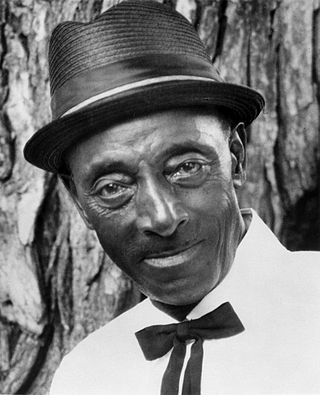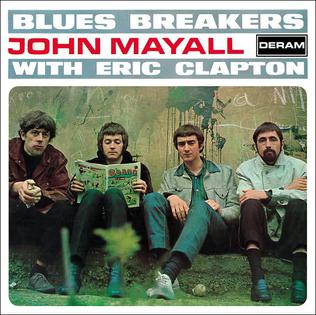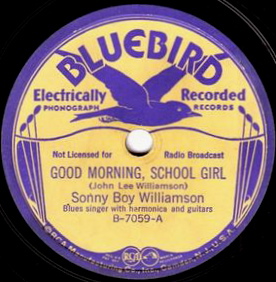Robert Ross is an American blues singer, songwriter, acoustic and electric guitarist, slide guitarist, and harmonica player. He is the leader of the Robert Ross Band and The Jazz-Manian Devils. He also performs as a solo artist.

Fred McDowell, known by his stage name Mississippi Fred McDowell, was an American singer and guitarist of hill country blues music.

Wheels of Fire is the third album by the British rock band Cream. It was released in the US in June 1968 as a two-disc vinyl LP, with one disc recorded in the studio and the other recorded live. It was released in the UK on August 9. It reached number three in the United Kingdom and number one in the United States, Canada and Australia, becoming the world's first platinum-selling double album. In May 2012, Rolling Stone magazine ranked it at number 205 on its list of the 500 greatest albums of all time. It was voted number 757 in the third edition of Colin Larkin's All Time Top 1000 Albums (2000).
Joe Lee Wilson was an American jazz singer from Bristow, Oklahoma, who lived in Europe since 1977.

Frederick G. Seibert is an American television producer and media proprietor. Often credited with having co-founded MTV in 1980, he has served as the company's creative director and president of its MTV Networks Online branch. He founded the production company Frederator Studios in 1998, as well as its spin-off entities Frederator Networks, Channel Frederator Network, and Cartoon Hangover. Having held numerous executive positions for Viacom Media Networks, he was the final president of animation studio Hanna-Barbera from 1992 to 1996. He has since co-founded Next New Networks, Bolder Media, and launched the production company FredFilms.

WKCR-FM is a radio station licensed to New York, New York, United States. The station is owned by Columbia University and serves the New York metropolitan area. Founded in 1941, the station traces its history back to 1908 with the first operations of the Columbia University Radio Club (CURC). In 1956, it became one of the first college radio stations to adopt FM broadcasting, which had been invented two decades earlier by Professor Edwin Howard Armstrong. The station was preceded by student involvement in W2XMN, an experimental FM station founded by Armstrong, for which the CURC provided programming. Originally an education-focused station, since the Columbia University protests of 1968, WKCR-FM has shifted its focus towards alternative musical programming, with an emphasis on jazz, classical, and hip hop.

Blues Breakers, colloquially known as The Beano Album, is the debut studio album by the English blues rock band John Mayall & the Bluesbreakers, originally credited to John Mayall with Eric Clapton. Produced by Mike Vernon and released in 1966 by Decca Records (UK) and London Records (US), it pioneered a guitar-dominated blues-rock sound.

Dick's Picks Volume 8 is the eighth live album in the Dick's Picks series of releases by the Grateful Dead. It was recorded on May 2, 1970, at Harpur College in Binghamton, New York. It was released in mid-1997.

Willie Lee "Big Eyes" Smith was an American electric blues vocalist, harmonica player, and drummer. He was best known for several stints with the Muddy Waters band beginning in the early 1960s.

"Good Morning, School Girl" is a blues standard that has been identified as an influential part of the blues canon. Pre-war Chicago blues vocalist and harmonica pioneer John Lee "Sonny Boy" Williamson first recorded it in 1937. Subsequently, a variety of artists have recorded versions of the song, usually calling it "Good Morning Little Schoolgirl".

Spring of Two Blue-J's is a 1974 live album by Cecil Taylor, the second set of a "return concert" recorded at The Town Hall in New York City in November 1973. Originally released on Taylor's Unit Core label, bootlegged on European CDs, it was legitimately reissued for the first time in 2022 on global streaming platforms by its original producer, Fred Seibert's Oblivion Records. The LP features one side-long solo performance by Taylor and one side-long quartet performance with Jimmy Lyons, Sirone, and Andrew Cyrille.
Johnny Woods was an American blues singer and harmonica player in the north Mississippi hill country blues style.
Tom Pomposello was an American roots musician, notably playing and recording with country blues musician Mississippi Fred McDowell, who also worked as a cable television and advertising producer for clients like Nickelodeon, Nick-at-Nite, and MTV. He died in a car accident outside of Kingston, New York in January 1999.

Oblivion Records is an independent American record label that focuses on under recorded blues and jazz musicians. The company was originally based in Huntington, New York and the WKCR-FM studios at Columbia University in New York City, with a post office box in Roslyn Heights, New York from 1972–1976. It now operates out of Los Angeles. After almost 50 years, Oblivion announced a new release in November 2021.

Live in New York is the final album recording by the American country blues musician Mississippi Fred McDowell. New York-based American independent Oblivion Records released the first edition in the Spring of 1972, months before McDowell's death in July 1972. A subsequent Oblivion issue with a one song substitution, and new and redesigned liner notes came out one year later.

His Best is a greatest hits album by Chicago blues harmonica player Little Walter, released on June 17, 1997 by MCA and Chess Records as a part of The Chess 50th Anniversary Collection. The album is seen as the CD successor to the 1958 The Best of Little Walter and features ten of the songs from that album.
"Sugar Mama" or "Sugar Mama Blues" is a blues standard. Called a "tautly powerful slow blues" by music journalist Charles Shaar Murray, it has been recorded by numerous artists, including early Chicago bluesmen Tampa Red, Sonny Boy Williamson I, and Tommy McClennan. John Lee Hooker and Howlin' Wolf later adapted "Sugar Mama" for electric blues and rock group Led Zeppelin reworked it during early recording sessions.
"Early in the Morning" is a blues song that was recorded by Sonny Boy Williamson I in 1937. Identified as one of his most successful and influential tunes, it was inspired by earlier blues songs. "Early in the Morning" has been recorded by various musicians, including Junior Wells, who made it part of his repertoire.

Blues Summit is the thirty-third studio album by B.B. King released in 1993 through the MCA label. The album reached peak positions of number 182 on the Billboard 200, and number 64 on Billboard's R&B Albums chart. The album won a Grammy Award in 1994 for Best Traditional Blues Album.
William J. Dicey was an American blues harmonicist, singer and songwriter. He recorded two live albums and one studio album in his own name, as well as playing the harmonica and singing on a number of other musician's recordings. He was a regular fixture in the New York blues scene from the 1970s to the time of his death.













